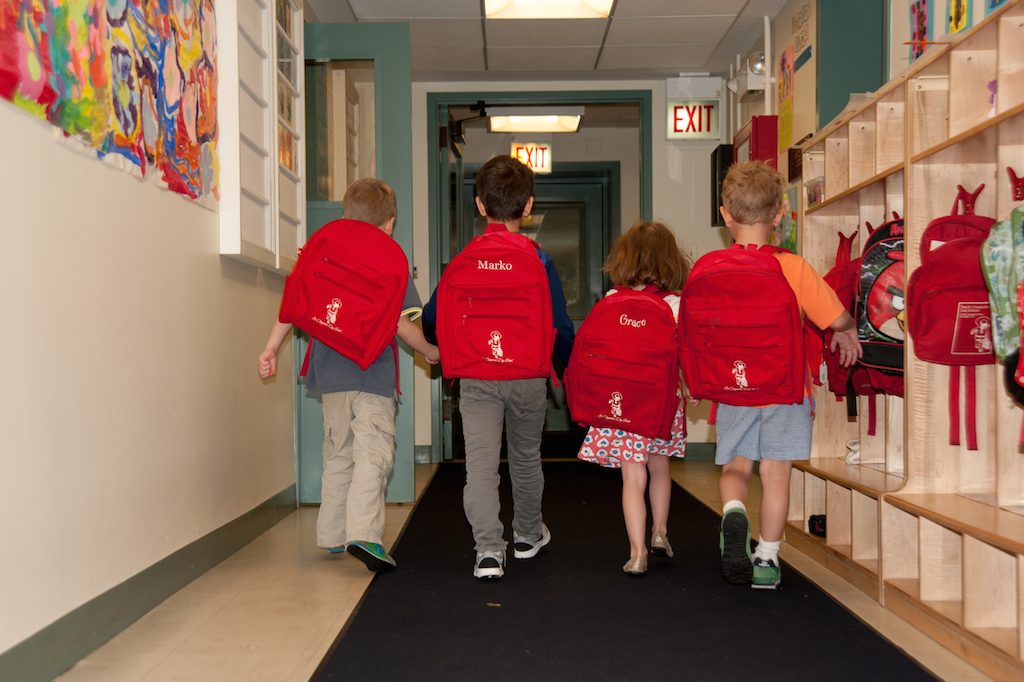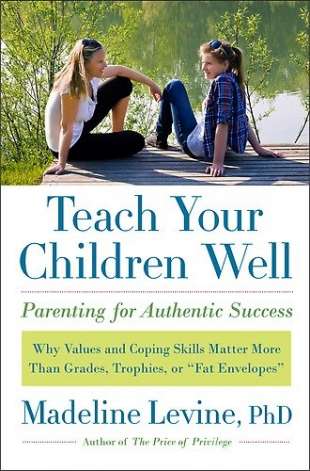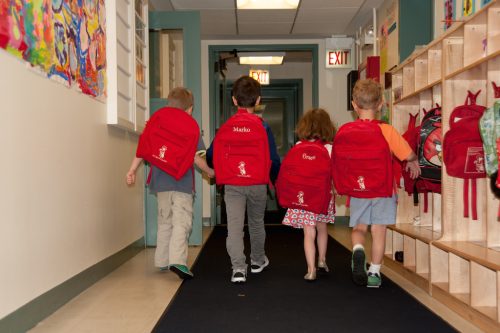
BY MARY ELLEN CHRISTY
When the pages of the calendar turn to September, the air turns cooler and crisper, leaves begin to turn, and there is a wonderful sense of fresh beginnings as children and parents anticipate the joys of beginning a new school year. School supplies have been purchased, backpacks selected, and appropriate clothing chosen for that all-important first day of school. Perhaps Meg Ryan said it best in the film You’ve Got Mail: “Fall makes me want to send you a bouquet of freshly sharpened pencils.”
If you are sending your tot or preschooler off for the first time, there may be some sense of separation anxiety on the part of both parents and children. Parental attitudes can play a key role in minimizing any anxiety on the part of children by managing their own anxiety. If you believe that your child will have fun at school then this is your guarantee that they will. So, relax and enjoy that first walk or ride to school together. After all, you are embarking on a great adventure together.
Do not feel the need to over-prepare your child. There is no qualifying exam for preschool, so resist the temptation to prepare your child for that first day other than to tell them that school is going to be fun. Preschool teachers the world over are caring people who take great pleasure in introducing young children to the joy of learning and each have an amazing “bag of tricks” to comfort a child who is tearful; to redirect the child’s attention and to connect them with the other children.
Your children will make friends, try new things, and, most important of all, realize that learning is fun. Other important things your child will learn in preschool: teachers are people who like to help children; not only is it ok to make a mistake, but we learn a lot from our mistakes; to share, take turns, and communicate with your words not your actions; and to stand up for yourself and respect the rights and property of others.

Photo by Kevin Hammett.
Children are born with the desire to learn new things and the drive to achieve them. Think back to when your child first learned to open and close a door—they practiced it repeatedly with tremendous pride and enthusiasm. Or when the first dressed themselves—although they may well have placed their shoes on the wrong feet, they held your assistance at bay by saying “I do, I do.” This was their way of demonstrating mastery of a task. This drive toward mastery will be repeated many times as they continue to assemble the scaffolding upon which they will build skills.
School age children, roughly kindergarten through fourth grade, easily retain their enthusiasm for school. Their world seems wide and wonderful. They are very busy acquiring and mastering the skills that will become the foundation for all future learning. They are engaged in activities that teach them to read, write, compute, and speak in front of a group and to problem solve using experimentation and/or cooperative learning. Simply put, we are learning to read and write during this time and, thereafter, we begin to focus on reading to acquire information and writing to communicate to others what we know.
This is a time when children are very engaged and enthusiastic learners and when they are most motivated by the challenge not by the grade, stars, or other rewards. It is this type of learning that will allow your child to continue the engagement and persistence that will ultimately lead to expertise. This can also be a time when differences in learning styles can become apparent. If this is the case in your family, please remember that these issues can often be purely developmental and can be attributed to maturation or chronological age.
You cannot underestimate the value of being patient with children. Enlist the advice of the teacher and recognize the teacher as your best ally. Many schools offer resource assistance to their students on site, so inquire about the availability and your child’s eligibility for these services. Discern some activities you child enjoys and is good at and focus on these. This will enhance your child’s confidence and give them a sense of achievement. It will also help them to develop what Madeline Levine calls “islands of competence.” Explain to your child that some things are difficult and some are easy, and that life often presents us with puzzles that we need to solve. This is a puzzle that you will be solving together.
Help your child to realize that there are many forms of intelligence. If she says, “Alice is really smart” in a manner that implies they do not see themselves as smart, you might ask: “In what way is Alice smart?” Remember that true self esteem does not derive from the praise of others but is born of a child’s recognition of his or her own competence. If your concerns remain serious, consult an expert and plan. Do not become your own child’s tutor. It is about as effective as teaching a spouse to drive.
For school-age children, education is not just preparation for life. It is the life they are living right now. Your role is to love and to advocate for your child. Here are some ways you can help children at this age:
- Stay curious with your child and embrace their understanding of the world as a miraculous place.
- Be attentive to your children’s questions. Often, the right question has more value than the right answer.
- Spend as much time together out of doors. Children are naturally drawn to nature and can learn much from it.
- Encourage children to take the risk of trying for an answer rather than focusing on the correct answer. Respond by saying something like: “That’s an interesting answer. Can you explain it to me more? Most people would have probably said something else, so I am curious about your reasons.” Someone’s willingness to take a risk and be wrong is responsible for most of human progress.
These school years are when the foundation of character is being laid, and it is a time when each parent needs to decide which is most important for their child: being smart or being good.

In adolescence, children are going through as rapid a period of growth and development as they did when they were preschoolers. They are doing so under the influence of friends and popular and social media. If ever there were a time when parents needed a sense of humor, this is it. This is usually the time when grades enter the picture, as do athletic experiences. Each of these becomes a form of public rating with posted lists of honor rolls and points scored. This is a time when peer groups have terrific influence, and we see the emergence of “mean girls and bullying boys.” In her book Teach Your Children Well, Madeline Levine lays out a manageable blueprint for Parenting for Authentic Success. She explains why values and coping skills matter much more that grades, trophies, and “fat envelopes” from prestigious schools. She writes with humor and offers sage advice.
Here are seven essential coping skills that will build resilience in any child but are particularly helpful to parents of adolescents:
- Teach kids resourcefulness by encouraging them to find their own solutions: “I can handle this instead of mom.”
- Encourage enthusiasm so they are more apt to say, “I love this” than “Whatever.”
- Encourage creativity: “Let’s look at this differently” instead of “What’s the right answer?”
- Develop a good work ethic: “I’m going to keep at it” instead of “I quit.”
- Teach them to act by exerting self-control: “It just doesn’t feel right” instead of “All the kids are doing it.”
- Focus on self-esteem so children say, “I feel good about myself” instead of “I suck.”
- Promote self-efficacy: “I can make a difference” instead of “Nothing I do matters.”
The adolescent years are a time of curiosity and exploration. Follow your child’s lead as to what is interesting. Hopefully they will carry this quest for discovery into adulthood. Happy and fulfilled adults know that there is always something more to learn and something else to be discovered.

Teenagers are fascinating creatures. They look like miniature adults, but they are subject to mood swings so pronounced that it can make you wonder What became of that child I love so much? They can be euphoric one minute and in the depths of despair the next. They can be making what seems to them a perfectly rational argument for permission to do something, that even they know is probably not a good idea. When you stand your ground they often dissolve into tears, which mirrors the coping strategy of a two-year-old. Living with them can be a terrific challenge, but it can also be a lot of fun because their energy and enthusiasm is contagious, and you are often getting a “sneak peek” at what they will be like as an adult.
More so now than ever before, they need you to be their anchor as they brave the emotional transitions needed to match up with their adult-looking bodies. The academic workload intensifies during this time, as does their physical growth, so make sure they are getting enough sleep and eating a healthy diet. They will need a quiet and comfortable designated space for concentrating on their work.

Regardless of your child’s age, this list of suggestions is designed to enhance your child’s school year and improve family life:
- Make sure your child gets a good night sleep.
- Give your child a nutritious breakfast.
- Try to have dinner together as a family and let the conversation focus on everyone’s day.
- Be reliable and consistent.
- Don’t interfere by doing things your child can already do independently.
- Establish the practice of weekly family meetings where everyone has a voice and where family chores are assigned to everyone, plans and issues affecting the coming week are discussed, and allowances are paid.
- Don’t overwhelm you child with praise.
- Allow your child to experience failure.
- Spend a lot of “you time” together simply having fun.
- Discuss the values that you as a family hold dear and write together a family values statement.
- Teach that change comes to all of us, all the time and embrace as a family the Trinity of Change: Self-reflection, Empathy, and Change.
Have a wonderful school year!
Author photo: Jessica Tampas Photography







